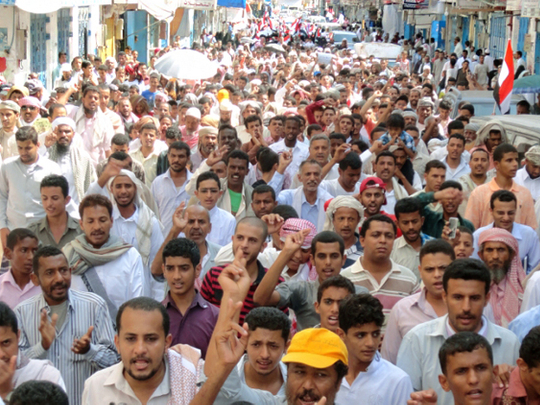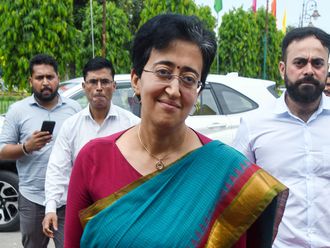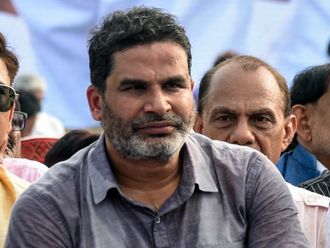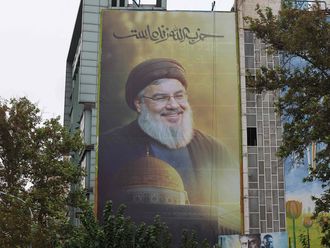
A new era has begun in Yemen after President Ali Abdullah Saleh signed the power transfer deal and transferred powers to his deputy, under a Gulf Cooperation Council agreement in Riyadh in the presence of Saudi King Abdullah Bin Abdul Aziz and Yemen's opposition parties.
This was a logical deal for Yemenis, because violence would not be the right way to reach a solution satisfactory to the Yemeni people especially in Saleh's era, which has seen the persistent killing of demonstrators and inflicting collective punishment on the people.
An implementation mechanism has been agreed upon. And this includes specific details and deadlines, with the assistance of the GCC and the United Nations — one of the safeguards that will help to implement the agreement.
The transition period began immediately after the signing, which saw a transfer of Saleh's powers to his deputy Abd Rabbo Mansour Hadi, while the former retains the title of the first president devoid of any authority until a presidential election is held within 90 days.
The General People's Congress and opposition parties should name their representatives in order to form a national unity government in two weeks, while Hadi will be calling for presidential elections within 90 days with the formation of a military commission to restructure the army and security forces. Then the second phase will begin with transitional period following presidential elections for two years when a comprehensive national dialogue will seek solutions to the problems of Yemen, particularly the core issue, South Yemen.
However, more political complications loom on the horizon. Plans and agendas from other groups have begun to surface.
Recently, a first southern conference was held in Cairo in the presence of former presidents of South Yemen, Ali Nasser Mohammad, Abu Baker Al Attas and hundreds of representatives of different groups from the south under the slogan "Together for self-determination for the people of the South".
In this conference a political vision was declared to resolve the issues in the south after the overthrow of Saleh's regime, including a proposal to turn Yemen into a federal state — a federation of two regions in north and south based on borders that existed before May 12, 1990 and a new constitution. There will be a period of transition for five years, followed by a referendum for southerners to determine the future of Yemen. It seems that politicians in the South who took part in this conference are seeking steps akin to the secession of southern Sudan and are trying to exploit the youth revolution in Yemen to serve their political interests.
It is clear that this political conference has increased the complexity of the situation in Yemen, instead of helping the youth who have been living in the streets for more than 10 months and have sacrificed their blood for north and south Yemen.
Secession
Why are the southern politicians calling for a secession referendum as they are the same politicians who unified Yemen without a referendum? Yes we all know it is a political game as those politicians sought united Yemen, when they lost their positions in the 1994 war between the south and the north.
Many people may not know that there are some political leaders who called for secession in the war of 1994 and their names were listed among the most wanted 16 in Yemen.
They were awarded the death penalty including, for example, Ahmad Obaid Bin Dagher, a former member of Socialist Political Party who returned after a general amnesty and made a deal with Saleh's political party and became Assistant Secretary-General of Saleh's ruling party. He earlier backed the most vocal opponents and critics of Saleh, and now he is a passionate advocate of Saleh's regime.
This does not indicate that all southern political leaders are the same as Dagher, but I hope to see them calling for consolidating the unity of Yemen by not giving any opportunity to those who have narrow self-interests to play with Yemen's future.
The country has begun to see the light of freedom at the hands of young people, who surprised the whole world with their endurance despite the violence and killings perpetrated by Saleh's forces.
On the other hand the Houthis in northern Yemen have surrounded the area of Damaj in the north of Yemen, for more than a month. Thousands of civilians who live in this area including children and women are calling for international help to end the siege and provide them food and medicine.
All these plans and agendas form obstacles and challenges to the new government. I believe it is time for all groups in Yemen to stand united and set any plan or agenda aside that does not serve the interests of Yemen, and take their first step towards democracy and freedom.









